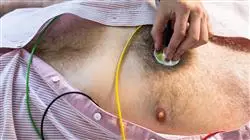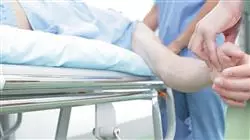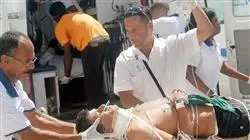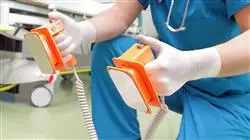University certificate
The world's largest faculty of medicine”
Description
Learn about the latest advances in Cardiovascular Critical Care in the Emergency Department”

Improve your knowledge in Cardiovascular Critical Care in the Emergency Department through this program, where you will find the best teaching material with real cases. Learn here about the latest advances in the specialty to be able to perform a quality medical practice"
The field of cardiology is one of the areas of great research activity, which leads to the frequent emergence of new studies, reviews, clinical practice guidelines, etc. that modify or should modify the management of patients with acute heart disease. Gaining up-to-date knowledge in this area is essential for cardiologists interested in developing specific skills in this area, for cardiologists who aren’t in daily contact with acute cardiac patients but need to be competent in dealing with them or for non-cardiologists who work in an environment where they treat these types of patients.
The program is structured in a clear way, allowing the student to take an orderly approach to each topic. The modules are divided in a simple way, focusing on each one of the main groups of acute heart disease. They are taught by professionals who combine their high academic skill level with their teaching experience and their dealings with critical cardiology patients. The learning tools and texts available to the student are fully up-to-date and are oriented to the development of skills which are directly applicable to clinical practice.
The structure of this Professional master’s degree unites the more theoretical content and latest developments on diagnosis and medical medical management, with other content that is focused on the students acquiring more practical skills as well. One of the modules in the Professional master’s degree is entirely dedicated to the development of practical skills and mastering the essential techniques for dealing with critical cardiovascular patients. A second module is focused on developing the essential skills for performing and interpreting echocardiograms (ECG), and their correlation with the patient’s clinical situation, to make decisions on the treatment and management of the patient.
The program is aimed at encouraging and enabling the development of essential skills in the management of a patient with acute heart disease. The type of student that will benefit from this Professional master’s degree is one that requires training or being brought up-to-date in the management of this type of patients. This mainly includes intensive care staff or anaesthetists who look after patients with heart disease, cardiologists who don’t have daily contact with acute patients, but need to be kept up-to-date in how to care for them, or cardiologists interested in perfecting and deepening their knowledge on how to care for patients with critical heart disease.
Update your knowledge through this Professional master’s degree in Cardiovascular Critical Care in the Emergency Department”
This Professional master’s degree in Cardiovascular Critical Care in the Emergency Department contains the most complete and updated scientific program on the market. The most important features of the program include:
- More than 75 clinical cases presented by experts in the different specialities. The graphic, schematic, and eminently practical contents with which they are created provide scientific and practical information on the disciplines that are essential for professional
- Diagnostic-therapeutic developments on assessment, diagnosis, and treatment in Cardiovascular Critical Care
- It contains practical exercises where the self-evaluation process can be carried out to improve learning
- Iconography of clinical and diagnostic imaging tests
- An algorithm-based interactive learning system for decision-making in the clinical situations presented throughout the course.
- With special emphasis on evidence-based medicine and research methodologies in cardiology
- Content that is accessible from any fixed or portable device with an Internet connection
This Professional master’s degree may be the best investment you can make when choosing a refresher program for two reasons: in addition to updating your knowledge in Cardiovascular Critical Care, you will obtain a Master's Degree from TECH Global University"
The teaching staff includes professionals from the field of Cardiovascular Critical Care, who bring their experience to this training program, as well as renowned specialists from leading scientific societies.
The multimedia content developed with the latest educational technology will provide the professional with situated and contextual learning, i.e., a simulated environment that will provide an immersive training program to train in real situations.
This program is designed around Problem Based Learning, whereby the physician must try to solve the different professional practice situations that arise during the course. For this purpose, the physician will be assisted by an innovative interactive video system created by renowned and experienced experts in the field of Cardiovascular Critical Care with extensive teaching experience.
Increase your decision-making confidence by updating your knowledge through this Professional master’s degree"

Take the opportunity to learn about the latest advances in Cardiovascular Critical Care and improve your patient care"
Objectives
The Professional master’s degree in Cardiovascular Critical Care in the Emergency Department is designed to facilitate the performance of the physician dedicated to the treatment of emergency heart problems.

This Professional master’s degree is designed to help you update your knowledge in Cardiovascular Critical Care, with the use of the latest educational technology, to contribute with quality and safety to decision-making, diagnosis, treatment, and patient support"
General Objectives
- Handle with ease the diagnostic arsenal available in a tertiary center for the management of critically ill cardiovascular patients
- Identify a patient in a serious or potentially serious short-term situation due to cardiovascular problems
- Explain the treatment indications and the therapy options in critical cardiovascular patients
- Lead a group attending to urgent or emergency situation caused by acute cardiovascular problems and guide fellow colleagues in the treatment of critical patients
Specific Objectives
- Explain the anatomical and functional alterations present in heart failure
- Explain the echocardiographic manifestations corresponding to these pathophysiological alterations
- Correlate the metabolic alterations produced in heart failure and the influence that medical treatment has on them
- Describe the pathophysiological and anatomical alterations in coronary circulation which leads to the appearance and clinical manifestation of ischemic heart disease
- Explain the recommendations collected in clinical practice guides in relation to the treatment of acute coronary syndrome
- Use the available resources in a way that guarantees continuous self-learning and periodically bringing knowledge in this area up to date
- Identify the possible complications in the context of acute coronary syndrome
- Describe the types of tachycardia and their differential diagnosis based on the electrocardiogram characteristics findings
- Identify the pharmacological and invasive treatment options and the scientific basis that supports each one
- Explain the expected and most common electrical alterations based on the patient profile and the underlying cardiac or extracardiac pathology
- Explain the types of bradyarrhythmias and their risk of progression to cardiac arrest due to asystole
- Describe the echocardiographic planes and the structures to look out for in each one of them
- Explain the hemodynamic calculations based on echocardiographic Doppler technology and their importance in the cardiovascular critical patient
- Identify the most common expected findings in an echocardiogram in a patient in surgery or undergoing structural or coronary interventionism
- Identify acute complications in patients with acute myocardial infarction
- Explain the indication of intubation, invasive and non-invasive mechanical ventilation in a critical cardiovascular patient
- Describe the hemodynamic and respiratory impact of each type of ventilation
- Identify the need for drainage in a pericardial effusion
- Know how balloon counterpulsation works and the indications and contraindications for its implantation
- Define the possible complications and the natural evolution of the patient undergoing cardiac surgery
- Explain the echocardiographic and hemodynamic alterations present in patients with indications of emergency surgery for acute valvular disease
- Identify the key aspects in the treatment of myocarditis, pericarditis and pericardial effusion

This program will generate a sense of confidence in your medical practice and will help you grow professionally”
Professional Master's Degree in Cardiovascular Critical Care in the Emergency Department
Medical care, aimed at patients in critical condition due to this type of disease, requires the strategic mobilization of theoretical and practical skills related to diagnosis and prescription in tertiary centers. For this reason, at TECH Global University, a program specialized in the management of critical situations has been created based on a thorough knowledge of the pathological substrates of heart failure and acute coronary syndrome. Thanks to the comprehensive curriculum, students will be able to use cardiac pacing techniques and devices, control arrhythmias, perform echocardiography and non-invasive cardiac imaging, and perform functional tests, following the proposed guidelines and recognizing the limitations imposed by special circumstances, such as pulmonary hypertension. Thus, at the end of the Professional Master's Degree, you will be able to understand, size and explain the indications of the treatments chosen, establish the most convenient therapeutic options and attenuate pain as much as possible.
Professional Master's Degree in Cardiovascular Critical Care in the Emergency Department
Studying this Postgraduate Certificate from TECH represents an important opportunity for the development of multiple competencies. On the one hand, it empowers in the identification and correlation of the different anatomical-functional alterations caused by these diseases, and on the other hand, in decision making under pressure and in the correct communication with colleagues and patients. All this, then, enables the graduate to perform with ease in the daily clinical practice of this area, either when diagnosing, prescribing or leading a team in urgent care for the exacerbation of complications. Likewise, at a more advanced level, they will be able to develop their skills in the anticipation of risks, establish early action plans, establish and indicate adequate treatments that adjust to the conditions of those affected and, based on the severity of the problem, evaluate recurrences, in order to avoid them and provide rapid support to eventualities.







